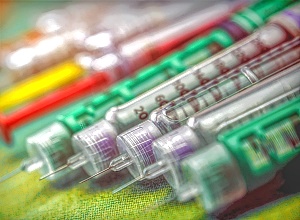A phase 2 trial reported in the New England Journal of Medicine found that a once-a-week insulin injection called icodec led to a similar reduction in blood sugar levels taking insulin daily and had a similar safety profile to daily insulin glargine (Lantus, Basaglar).
"This is the first once-a-week injectable insulin, and this study suggests it's. If it does well through scrutiny in phase 3 trials, it could make life easier for people with type 2 diabetes," explained Dr Robert Gabbay, chief science and medical officer for the American Diabetes Association, in a MedicalXPress report.
"Getting people to start insulin is often a challenge, but if you only have to do it once a week, that may help," he added.
The study included nearly 250 people with type 2 diabetes, aged 18 to 75. None had received long-term insulin therapy before the trial.
The participants' diabetes was considered inadequately controlled, with A1Cs of 7% to 9.5%. A1C is a measure that estimates blood sugar levels over two months or so. A1C goals vary by individual, but often the goal is to be under 7%.
During the six-month trial, half of the participants were randomly assigned to take weekly injections of icodec. The remaining volunteers took insulin glargine daily.
By the end of the trial, people taking icodec saw a 1.33 percentage point drop in their A1C. The insulin glargine group dropped by 1.15 percentage points. Both groups had average A1Cs under 7% after starting insulin therapy.
One concern with any type of insulin therapy is low blood sugar (hypoglycaemia). Taking insulin is a balancing act. Too little insulin and your blood sugar levels stay too high, which can eventually lead to complications if that happens regularly. Too much insulin can cause your blood sugar to drop to dangerous levels that can make you feel awful, and lead to unconsciousness and even death if left untreated.
The two types of insulin had similar levels of severe hypoglycaemic events. Most of the adverse events in this trial were mild, however.
Dr Akankasha Goyal, an endocrinologist at NYU Langone Health, said, "This is a very promising, innovative treatment. The insulin gradually releases over seven days. So far, the efficacy and safety are similar between icodec and insulin glargine."
Goyal added, "Right now, insulin is a daily injection and we have a lot of resistance toward it. Icodec is more convenient and the once-a-week injection is a selling point."
Both Gabbay and Goyal said they can envision multiple groups that could be helped by a weekly insulin. One group, Gabbay noted, is older teens and young adults who have unpredictable lifestyles and might miss taking a daily insulin around the same time every day.
Another is elderly patients—whether they live on their own, have visiting nurse services or live in a nursing home.
Once-Weekly Insulin for Type 2 Diabetes without Previous Insulin Treatment
Authors.
Julio Rosenstock, Harpreet S. Bajaj, Andrej Janež, Robert Silver, Kamilla Begtrup, Melissa V. Hansen, Ting Jia, and Ronald Goldenberg, for the NN1436-4383 Investigators.
Published in the New England Journal of Medicine 26 November 2020; 383:2107-2116
DOI: 10.1056/NEJMoa2022474
Abstract
BACKGROUND
It is thought that a reduction in the frequency of basal insulin injections might facilitate treatment acceptance and adherence among patients with type 2 diabetes. Insulin icodec is a basal insulin analogue designed for once-weekly administration that is in development for the treatment of diabetes.
METHODS
We conducted a 26-week, randomised, double-blind, double-dummy, phase 2 trial to investigate the efficacy and safety of once-weekly insulin icodec as compared with once-daily insulin glargine U100 in patients who had not previously received long-term insulin treatment and whose type 2 diabetes was inadequately controlled (glycated hemoglobin level, 7.0 to 9.5%) while taking metformin with or without a dipeptidyl peptidase 4 inhibitor. The primary end point was the change in glycated hemoglobin level from baseline to week 26. Safety end points, including episodes of hypoglycemia and insulin-related adverse events, were also evaluated.
RESULTS
A total of 247 participants were randomly assigned (1:1) to receive icodec or glargine. Baseline characteristics were similar in the two groups; the mean baseline glycated hemoglobin level was 8.09% in the icodec group and 7.96% in the glargine group. The estimated mean change from baseline in the glycated hemoglobin level was −1.33 percentage points in the icodec group and −1.15 percentage points in the glargine group, to estimated means of 6.69% and 6.87%, respectively, at week 26; the estimated between-group difference in the change from baseline was −0.18 percentage points (95% CI, –0.38 to 0.02, P=0.08). The observed rates of hypoglycemia with severity of level 2 (blood glucose level, <54 mg per deciliter) or level 3 (severe cognitive impairment) were low (icodec group, 0.53 events per patient-year; glargine group, 0.46 events per patient-year; estimated rate ratio, 1.09; 95% CI, 0.45 to 2.65). There was no between-group difference in insulin-related key adverse events, and rates of hypersensitivity and injection-site reactions were low. Most adverse events were mild, and no serious events were deemed to be related to the trial medications.
CONCLUSIONS
Once-weekly treatment with insulin icodec had glucose-lowering efficacy and a safety profile similar to those of once-daily insulin glargine U100 in patients with type 2 diabetes.
(Funded by Novo Nordisk; NN1436-4383 ClinicalTrials.gov number, NCT03751657. opens in new tab.)
[link url="https://www.nejm.org/doi/full/10.1056/NEJMoa2022474?"]Full NEJM study (Subscription required)[/link]
[link url="https://medicalxpress.com/news/2020-09-once-a-week-insulin-diabetes-early-trial.html"]Full MedicalXPress report[/link]

